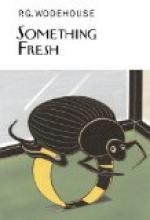“But you aren’t a young man of good appearance,” he said.
“I don’t know what you mean. But Aline Peters is an old friend of mine. She told me her father would give a large reward to whoever recovered the scarab; so I—”
“Look out!” whispered Ashe. “Run! There’s somebody coming!”
There was a soft footfall on the stairs, a click, and above Ashe’s head a light flashed out. He looked round. He was alone, and the green-baize door was swaying gently to and fro.
“Who’s that? Who’s there?” said a voice.
The Efficient Baxter was coming down the broad staircase.
A general suspicion of mankind and a definite and particular suspicion of one individual made a bad opiate. For over an hour sleep had avoided the Efficient Baxter with an unconquerable coyness. He had tried all the known ways of wooing slumber, but they had failed him, from the counting of sheep downward. The events of the night had whipped his mind to a restless activity. Try as he might to lose consciousness, the recollection of the plot he had discovered surged up and kept him wakeful.
It is the penalty of the suspicious type of mind that it suffers from its own activity. From the moment he detected Mr. Peters in the act of rifling the museum and marked down Ashe as an accomplice, Baxter’s repose was doomed. Nor poppy nor mandragora, nor all the drowsy sirups of the world, could ever medicine him to that sweet sleep which he owed yesterday.
But it was the recollection that on previous occasions of wakefulness hot whisky and water had done the trick, which had now brought him from his bed and downstairs. His objective was the decanter on the table of the smoking-room, which was one of the rooms opening on the gallery that looked down on the hall. Hot water he could achieve in his bedroom by means of his stove.
So out of bed he had climbed and downstairs he had come; and here he was, to all appearances, just in time to foil the very plot on which he had been brooding. Mr. Peters might be in bed, but there in the hall below him stood the accomplice, not ten paces from the museum’s door. He arrived on the spot at racing speed and confronted Ashe.
“What are you doing here?”
And then, from the Baxter viewpoint, things began to go wrong. By all the rules of the game, Ashe, caught, as it were, red-handed, should have wilted, stammered and confessed all; but Ashe was fortified by that philosophic calm which comes to us in dreams, and, moreover, he had his story ready.
“Mr. Peters rang for me, sir.”
He had never expected to feel grateful to the little firebrand who employed him, but he had to admit that the millionaire, in their late conversation, had shown forethought. The thought struck him that but for Mr. Peters’ advice he might by now be in an extremely awkward position; for his was not a swiftly inventive mind.
“Rang for you? At half-past two in the morning!”




